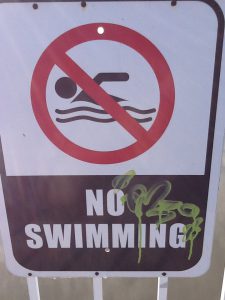Health advisories issued by the Department of Health (DOH) due to high levels of fecal bacteria have been a problem for some parts of the Pensacola Bay system for decades. Though most of the samples collected near our beaches rarely require them (usually between 0-5%) the bayous near downtown have been at, or above, 30% of the samples. Bayou Chico is often between 50-60% of the samples. Fecal bacteria have been such a problem in Bayou Chico that it was required to adopt a state Basin Management Action Plan (BMAP) to rectify the problem.

Photo: Rick O’Connor
I began following the health advisory reports provided by DOH’s Healthy Beaches Program in 2012. As mentioned above, swimming beaches near our islands rarely have health advisories issued. The problem was with the three bayous near downtown. In 2012 all three consistently reported 30%, or more, of their samples required an advisory to be issued.
To rectify the problem the city and county have been doing a lot of work replacing old infrastructure that allowed sewage to leak from pipes or reach surface waters through sanitary sewage overflows. Many communities around these bayous are converting from old septic systems to sewer, the communities around Bayou Texar are now all on sewer. These same efforts are occurring along the north shore of Bayou Grande, and in neighborhoods around Bayou Chico. Between 2012 and the present, I have seen the frequency of health advisories decline some. Bayou Texar hovers around 30%, some years they are below, others above the mark. In recent years Bayou Grande has consistently been between 25-30%. Bayou Chico has declined some but is usually at or above 30%.
In 2023, for the first time since I began following this, all 13 sites monitored in Escambia County were below 30%.
2023
| Body of Water | Number of samples taken | Percent of samples requiring an advisory |
| Bayou Texar | 45 | 22 |
| Bayou Grande | 18 | 22 |
| Bayou Chico | 19 | 21 |
| Bruce Beach | 46 | 9 |
| Big Lagoon State Park | 19 | 5 |
| Sanders Beach | 46 | 4 |
| Casino Beach | 18 | 0 |
| Park East | 18 | 0 |
| Park West | 18 | 0 |
| Quietwater Beach | 18 | 0 |
| Ft. Pickens | 7 | 0 |
| Johnson’s Beach | 7 | 0 |
| Opal Beach | 7 | 0 |
It is worth noting that our rainfall was low this year as well. Historically, Pensacola received 60-61 inches of rain a year. Over the last decade this has increased to 70-71 inches. The current rainfall total for 2023 is 58 inches. Many studies show a strong correlation between rainfall and the number of advisories issued. It may very well be that the reduction in rainfall played a large part in the reduction of health advisories. Despite a lot of progress repairing infrastructure, and this effort needs to continue, there are still some issues.
Along with the city and county retrofitting old infrastructure, there are things area residents can do as well.
- Many of these are related to poorly maintained septic systems throughout the area. If you are a septic system owner and would like to learn more on how to properly maintain your septic system, contact your county extension office.
- If you are a septic system owner and are interested in converting to sewer to reduce the need for maintenance, contact our county extension office. For some communities in the Pensacola area, there is a cost share program with DOH to help make this conversion.
- If you are on a sewer system in one of the older parts of town, the pipe leaving your house and connecting to the line under the street is your responsibility and may need repairing or replacing. Many plumbing companies have a television scope that can examine this line and provide you feedback.
- For everyone, be careful what your pour down the drain. Fats, Oils, Grease, and even milk can clog the pipes and cause sanitary sewage overflows or backups in the system. Heavy rains only make this worse. In the Pensacola area the Emerald Coast Utilities Authority (ECUA) provides free plastic gallon jugs to place your cooking oil and grease in and, when full, can be swapped for another at several locations around town. To find the closest disposal site to you visit https://ecua.fl.gov/live-green/fats-oils-grease.

Photo: Rick O’Connor
Despite low rainfall this year, it is still good that all 13 sites were below 30% this year. With the help of the local governments, agencies, and residents, hopefully it will remain so.
The information provided here can be used by communities all along the Florida panhandle. High fecal bacteria count, and health advisories are not limited to the Pensacola Bay System. Contact your county extension office for more information on how you can help to reduce health advisories in your area.
 4
4
